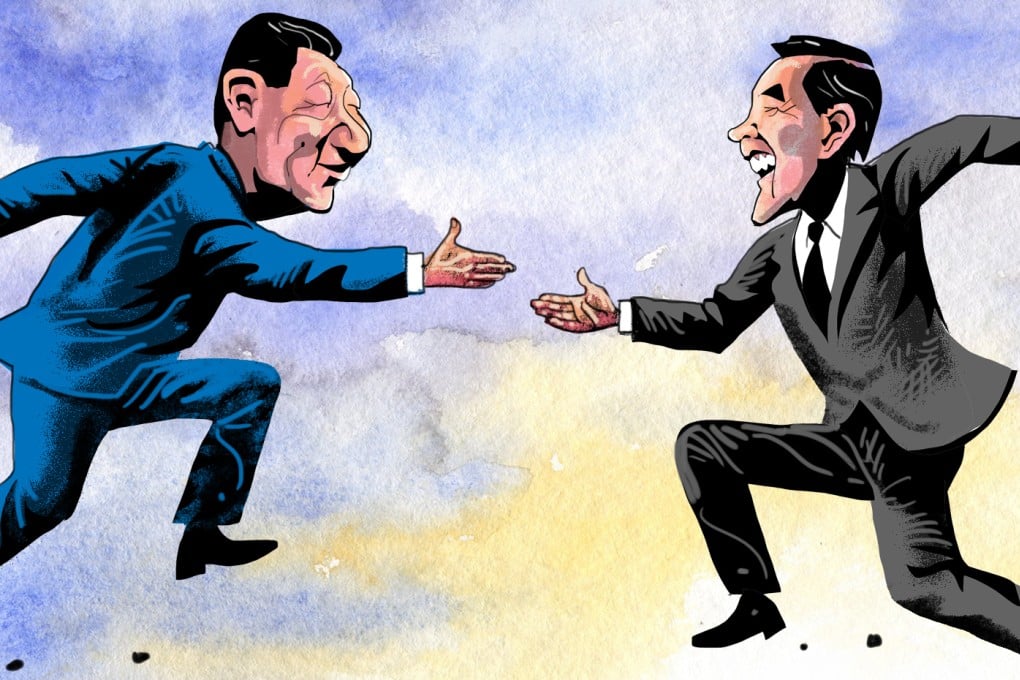Meeting face to face, Xi Jinping and Ma Ying-jeou take a big leap of faith towards peace
Lawrence J. Lau believes the meeting of Xi Jinping and Ma Ying-jeou, as equals, lays the foundation for lasting peace for their peoples

The historic summit meeting between President Xi Jinping (習近平) and President Ma Ying-jeou in Singapore last Saturday was the very first time the leaders of the two sides of the Taiwan Strait have met face to face since the meeting between Chiang Kai-shek and Mao Zedong (毛澤東) in Chongqing (重慶) in 1945. This is indeed a milestone – the culmination of the progress in the development of “formal” relations between the two sides since the similarly historic “ice-breaking journey” undertaken by Dr Lien Chan, then chairman of the Kuomintang, in 2005, to meet then president Hu Jintao (胡錦濤) in his capacity as general secretary of the Chinese Communist Party. That ushered in a period of party-to-party relations at the highest levels.
There were secret but widely known meetings between the confidants of president Jiang Zemin (江澤民) and president Lee Teng-hui in Macau and elsewhere in the early 1990s, but nothing seemed to have come of it. The Hu-Lien meeting, in turn, harked back to another historic meeting – that between the late Koo Chen-fu and Wang Daohan, as the heads of, respectively, the Straits Exchange Foundation and the Association for Relations Across the Taiwan Strait, the “non-governmental” organisations responsible for cross-strait relations, in 1993, and also in Singapore.

Because of this meeting, Ma’s position in history is assured
Ma has clearly contributed greatly to the improvement of cross-strait relations during his administration. Between 2008 and 2014, Taiwanese exports to the mainland grew from US$103 billion to US$152 billion, while exports from the mainland to Taiwan also grew, from US$26 billion to US$46 billion, with Taiwan running a trade surplus of over US$100 billion a year. During the same period, mainland visitors to Taiwan jumped from 280,000 to about 4 million while Taiwanese visitors to the mainland increased from 4.36 million to 5.37 million.

But more than anything else, over the past eight years, both sides have quietly engaged in building mutual confidence and developing mutual trust. For example, on the diplomatic recognition front, there was basically a standstill, with both sides refraining from trying to persuade another country to switch recognition from one side to the other. This has resulted in significantly reduced tensions and potential conflicts between the two sides.
It is no secret that Ma wanted a meeting with Xi, but only under conditions of equality, dignity and mutual respect, even though the mainland is much larger and more powerful than Taiwan. It took a most far-sighted President Xi to take a bold, decisive and magnanimous step to meet President Ma one-on-one, as equals (even though they only addressed each other as “mister”). This represents a major concession to Taiwan – that a national leader would treat the leader of a “breakaway” region as an equal. There was certainly opposition to this summit meeting on both sides, inside and outside the respective governments. But they did manage to meet, as partners in an enterprise to ensure a peaceful journey as well as a peaceful end. I believe leaders of both sides of the strait feel that they have the responsibility to their own people to make sure that whatever happens, happens peacefully.
